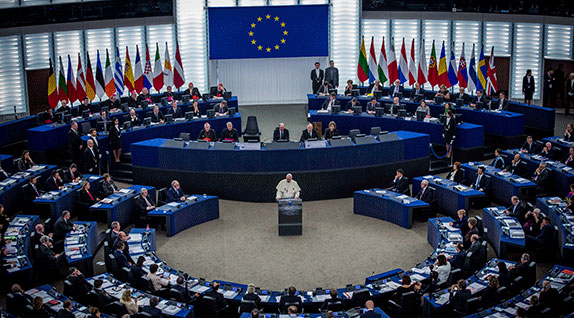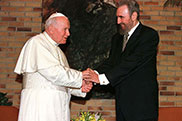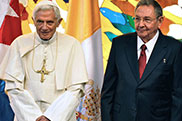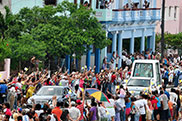 Claude Truong-Ngoc/Wikimedia Commons/CC-BY-SA-3.0
Claude Truong-Ngoc/Wikimedia Commons/CC-BY-SA-3.0
Article
The thaw in diplomatic relations between Cuba and the United States is just the beginning of greater Vatican involvement in world affairs.
Learn the why behind the headlines.
Subscribe to the Real Truth for FREE news and analysis.
Subscribe NowCubans and Americans alike watched with amazement as Presidents Raul Castro and Barack Obama announced that after more than 50 years, they had reestablished diplomatic relations. The last stronghold of the Cold War had breathed its last.
A swap had been made. Members of the Cuban Five, who were charged with terrorist activities in the U.S. and jailed for a decade, had been sent back to the island. Imprisoned U.S. contractor Alan Gross, who was accused of distributing banned telecommunication technologies to Havana’s tiny Jewish community while working for USAID, along with another unnamed government intelligence official, was freed.
Cheers resounded in shops, schools and hotels throughout Havana. A classroom of young musicians had tears in their eyes upon hearing the news. For the first time, American and Cuban flags hung together from balconies.
Renewed relations are another step toward possibly lifting the bloqueo, the embargo long faulted for stopping Cubans from receiving supplies. American tourists just 90 miles off their home shores could spend money with credit cards. A U.S. embassy would once again be established. Construction materials could be imported to fix the nation’s cracked and crumbling mansions now used for state housing. The Internet could become more accessible. The 1950s cars that for so long had been held together by rusty coat hangers and aluminum cans could receive updated parts.
 Paul Hanna/AFP/Getty Images
Paul Hanna/AFP/Getty ImagesA new era seemed to be dawning between the two countries. All because of…the pope?
Almost immediately, information circulated about the Vatican’s involvement with the communist country. In fact, Pope Francis had previously written a letter to both presidents urging them to “initiate a new phase in relations,” which essentially jumpstarted the entire process and led to the reconciliation.
This fact stunned many…the Vatican?
But perhaps it should not have been so much of a surprise. The Holy See, or the government of the Vatican, regularly sends emissaries around the world to be involved in multiple levels of diplomacy between nations. Their ambassadors are credited with having better on-the-ground information because of their ability to tap information from nuns and priests in local parishes.
More than 80 countries also have embassies in Italy for the Holy See, meaning there is an army of men and women whose sole purpose is to nurture the relationship between their countries and the Vatican.
In addition, the Holy See has special “permanent observer” status within the United Nations General Assembly and the Food and Agriculture Organization, and has full diplomatic relations with 177 countries out of 193 in the UN. It is even a member of organizations such as the International Atomic Energy Agency and the UN World Tourism Organization.
Unknown to most, the pope and the Vatican have long been involved both behind-the-scenes and in outright ways in many high-level diplomatic efforts—a trend that is bound to continue.
Intertwined in History
In the case of Cuba and the U.S., the Vatican sought reconciliation between the two countries for years, according to Financial Times.
“The Vatican has long taken a keen interest in US-Cuba relations, including John XXIII’s effort to end the Cuban missile crisis in October 1962. In recent decades, both John Paul II and Benedict XVI made visits to the island, which is more than 60 per cent Catholic, creating a well of trust Pope Francis was able to draw on.”
In 1998, John Paul became the first pope to visit the island nation since Fidel Castro’s 1959 revolution. Less than 10 years later, Benedict was the first pope to reopen a Catholic church on the island. While in Cuba, he also gained favor with the American Jewish community by agreeing to discuss with Mr. Castro the case of a man jailed the year before for espionage.
The Associated Press stated: “Pope Francis rightly got credit for helping bring the US and Cuba together and free US government subcontractor Alan Gross. But it was the Pope’s predecessor, Emeritus Pope Benedict XVI, who made the first high-level Vatican manoeuvre to release Gross, spurred in part by an unlikely group of papal lobbyists.”
“The American Jewish Committee was one of several Jewish groups that approached the Vatican in the months before Benedict’s March 2012 visit to Cuba to ask that the German pontiff raise the issue of the Jewish captive on humanitarian grounds with Cuba’s leadership, The Associated Press has learned.”
While the effort failed to yield the lifting of the embargo or the prisoner’s release, the case garnered further attention in Washington circles.
Cardinal Jorge Bergoglio, who later became Pope Francis, was present during John Paul II’s 1998 visit to Cuba and also authored a book about the Catholic leader’s meeting with the longtime dictator.
As a result of Francis’s reconciliatory efforts, this year will be the first Summit of the Americas that Cuba has been invited to attend, having been the only country excluded from the proceedings since the organization began.
 Adalberto Roque/Pool/AFP/Getty Images
Adalberto Roque/Pool/AFP/Getty ImagesA native of Argentina, Francis is no stranger to the effect Cuba’s political situation has played in his home continent. For many decades, he witnessed military juntas and government instability throughout Central and South America and saw their results.
For example, he lived in Argentina during the nation’s Dirty War, during which the Argentinian government was responsible for the disappearance of thousands of political opponents. Many were said to have been taken from their homes and then dropped out of planes. To this day, thousands of families have not received answers about what happened to their loved ones.
“Francis’ experience of poverty and structural inequality in his homeland also influenced his view that economic injustice is at the heart of the world’s conflicts,” Religion News Service explained. “It’s the lens he used to explain his ideas on peacemaking…”
To signify the importance of the continent to him, he appointed a pair of men familiar with the area’s policies to two of the top positions within the Catholic Church. In addition, his eight-person advisory board is filled with men who have experience working in Latin America and developing nations.
Vision for the Vatican
After taking office, Francis laid out his diplomatic plan, which included evangelizing the masses through outreach, employing principles of social justice, an emphasis on inequality as “the root of social ills” and interreligious dialogue.
In an encyclical that he coauthored with his predecessor, Pope Francis wrote: “For the Church today, three areas of dialogue stand out where she needs to be present in order to promote full human development and to pursue the common good: dialogue with states, dialogue with society—including dialogue with cultures and the sciences—and dialogue with other believers who are not part of the Catholic Church. In each case, ‘the Church speaks from the light which faith offers’, contributing her two thousand year experience and keeping ever in mind the life and sufferings of human beings. This light transcends human reason, yet it can also prove meaningful and enriching to those who are not believers and it stimulates reason to broaden its perspectives.”
Throughout his time in office, Francis has used dramatic gestures to further his diplomatic efforts. During a visit to Israel, he prayed with his head against the controversial wall dividing Israel from the West Bank and recognized Palestine as a state. Then he accompanied Israeli Prime Minister Benjamin Netanyahu to a place that had special significance to Israelis and prayed there. He regularly shuns his bulletproof popemobile for normal cars and walks among thronging crowds to the dismay of his security teams. While in Turkey, he knelt and asked for the blessing of Orthodox Patriarch Bartholomew I, the leader of 300 million followers. This had never before been done by a pope.
His decision to intervene in Cuba was described by Time magazine as “perhaps Pope Francis’ boldest foreign policy move yet, but it is not his first.” According to the outlet:
- “He showed letter-writing prowess in September 2013, when he wrote to Russian President Vladimir Putin, host of the G-20 Summit which Obama was attending, urging world leaders and the United States to oppose a military intervention in Syria.”
- “After visiting Bethlehem and Jerusalem in May, Pope Francis hosted both Israeli president Shimon Peres and Palestinian Authority president Mahmoud Abbas at the Vatican for a joint prayer service for Middle East Peace.”
- “When he visited South Korea in August, he sent a telegram to Chinese President Xi Jinping when the papal plane crossed into Chinese airspace—a historic step toward improved relations since the last time a pope visited East Asia, Chinese officials did not allow the plane to fly over Chinese territory.”
As to not offend the Chinese, he also refused to meet with the Dalai Lama, whom China considers a political dissident.
 STR/AFP/Getty Images
STR/AFP/Getty ImagesOn the Middle Eastern front, in December 2014, Pope Francis issued a letter to Christians there in an attempt to comfort them in their time of trial due to religious persecution. But he also used the letter to make pointed political statements (emphasis added): “The majority of you live in environments which are predominantly Muslim. You can help your Muslim fellow citizens to present with discernment a more authentic image of Islam, as so many of them desire, reiterating that Islam is a religion of peace, one which is compatible with respect for human rights and favours peaceful coexistence on the part of all. This will prove beneficial for them and for all society. The tragic situation faced by our Christian brothers and sisters in Iraq, as well as by the Yazidi and members of other religious and ethnic communities, demands that all religious leaders clearly speak out to condemn these crimes unanimously and unambiguously, and to denounce the practice of invoking religion in order to justify them.”
He further stated: “At the same time I continue to urge the international community to address your needs and those of other suffering minorities, above all by promoting peace through negotiation and diplomacy, for the sake of stemming and stopping as soon as possible the violence which has already caused so much harm. I once more condemn in the strongest possible terms the traffic of arms. Instead, what are needed are plans and initiatives for peace, so as to further a global solution to the region’s problems. How much longer must the Middle East suffer from the lack of peace? We must not resign ourselves to conflicts as if change were not possible! In the spirit of my pilgrimage to the Holy Land and the subsequent prayer meeting in the Vatican with the Israeli and Palestinian presidents, I encourage you to continue to pray for peace in the Middle East. May those forced to leave their lands be able to return and to live in dignity and security.”
For his work with Jewish communities around the world, he has also garnered the title as the most “Jewish” pope to date, having developed a strong connection with Argentina’s Jewish community and even co-authored a book with Argentinian rabbi Abraham Skorka.
“There has never been a Pope with as deep an understanding of Jews as Pope Francis,” Rabbi David Rosen, leader of the American Jewish Council said in a statement on the organization’s website.
Pope Francis has repeatedly called for peace in the Middle East region and continues to stay involved in the peacemaking process through the updates he receives regularly from his diplomatic corps.
In addition, through his tenure, he has also continued to speak against economic inequality and even climate change—two topics that he addressed in his Evangelii Gaudium (“The Joy of the Gospel”) and with which he has found solidarity with U.S. President Barack Obama.
20th Century
The diplomatic approach of Benedict and Francis follows in the footsteps of John Paul II, who was pope from 1978-2005.
John Paul II’s greatest diplomatic achievement was helping to bring down the Berlin Wall and end communism in his native Poland—and all of Europe. Francis acknowledged John Paul II’s role in this historic event on the 25th anniversary of the wall coming down.
The Associated Press reported: “Pope Francis has hailed St. Pope John Paul II’s role in the fall of the Berlin Wall and urged people to build bridges by opening hearts.
“Francis marked the 25th anniversary…of the destruction of the wall symbolizing the Cold War by appealing to all those of good will to foster a ‘culture of coming together’ to bring down all barriers still dividing the world.”
But how did John Paul II succeed in bringing down the Berlin Wall? The same way Francis has improved relations with Cuba and the U.S.: by working with the most powerful politician on the planet.
Time magazine reported in 1992 that the pope and U.S. President Ronald Reagan “agreed to undertake a clandestine campaign to hasten the dissolution of the communist empire.”
It worked. The Berlin Wall fell, and the Soviet Union soon after.
The tag team of pope and president has been a winning way to effect change in the world.
This pattern began when Woodrow Wilson met with Pope Benedict XV in 1919. The first Catholic president, John F. Kennedy, was the one who really pushed things forward by visiting Vatican City in 1963. The ties slowly grew until Ronald Reagan and Pope John Paul II backed the common goal to end communism.
Other presidents also had close ties to John Paul II. For example, George H.W. Bush, Bill Clinton, and George W. Bush all attended his funeral.
George W. Bush continued the trend with Pope Benedict XVI. The two had a friendly relationship and wished to see Christian values spread through the world in a time where radical Islam was making headlines.
Now President Obama appears to have teamed up with the Vatican to address societal problems such as income inequality, unemployment and even climate change.
While the relationship between pope and president has grown over the years, it is not the Vatican-American connection that is most interesting. Rather, it is that the pope seeks out the most powerful political leader alive—and that the U.S. president seeks out the most powerful spiritual leader alive.
“The real extent of the Vatican’s power is hard to compute,” The Economist stated. “One in every six human beings was baptised into the pope’s church. Of course, many quit the faith, but he remains a global opinion-former. His views can sway Catholic votes—a point not lost on American presidents, who rarely miss a chance to visit the Vatican.”
Popes have held varying amounts of power for centuries, but the emphasis on subtle diplomacy is a relatively newer trend for the Vatican.
Changing Tactics
The role of pope as diplomat is the product of substantial changes in the Catholic Church over the last 100 years. The organization had to reinvent itself for the 20th century.
For much of its existence, the Catholic Church had land holdings, could tax citizens, and had an army to enforce its will (which included spreading church doctrine). It was a powerful state, with the pope having both physical and spiritual clout.
But this changed in the second half of the 1800s. In 1870, the papal states were stripped away. At the time, Pope Pius IX became a “prisoner in the Vatican.” He was forced to give up his secular power and instead worked to consolidate his spiritual power.
The 11th edition of the Encyclopaedia Britannica described this time: “Pius might no longer rule over the papal states; but there was consolation in the thought that, within the realm of conscience, his power had increased by leaps and bounds. The whole history of the 19th century [was a continuous effort] to exalt the importance of the papacy.”
This drive to increase the prominence of the papacy continued into the 20th century. Finally, in 1929, Italian Prime Minister Benito Mussolini signed the Lateran Treaty which made the 109-acre Vatican City into its own official nation. At the time, Italy also gave the Vatican $92 million (about $1 billion in today’s dollars) in reparations for taking the papal states. The money infused a cash-strapped church, and allowed it to hasten its transformation into the global moral authority seen today.
Popes have had to change their approach to spreading their message. The 20th century inventions of radio and television have been handily used to push forward the messages of the popes. They have also increasingly used their celebrity to advance their public and political agendas.
For example, Pope John Paul II was particularly skilled at using small theatrical gestures on television to get his point across. Today, Francis does the same and has even taken to social media outlets such as Twitter. His Twitter feed is translated into nine languages and is followed by 17 million people.
Focus on Home
Aside from working with the Americas, Pope Francis has also turned his eyes toward the very place in which the Vatican is housed: Europe. Despite the pope’s personal effectiveness in the public arena, he realizes that to achieve his ultimate vision for the world, it requires buy-in and support from politicians and other leaders.
“History’s first pope from outside the West travelled to the heart of secular Europe…and delivered a sharp wake-up call, warning European leaders that the continent risks irrelevance if it doesn’t recover its founding values, drawing in part on its Christian legacy,” an article in Vatican insider magazine Crux reported.
“Pope Francis delivered back-to-back speeches to the European Parliament and the Council of Europe that amounted to a strong call to Europe to get both its social and its spiritual house in order.
“Before roughly 750 members of the European parliament, Francis bluntly said today’s world is becoming ‘less and less Eurocentric,’ that Europe often comes off as ‘elderly and haggard,’ that it’s less and less a ‘protagonist’ in global affairs, and that the rest of the planet sometimes sees it ‘with mistrust and even suspicion.’
“‘Where is your vigour?’ Francis asked the Council of Europe, deliberately speaking through it to the entire continent. ‘Where is that idealism that inspired and ennobled your history?’”
The article further stated, “Francis insisted that recovering Europe’s Christian history and entering into ‘meaningful’ and ‘open’ dialogue with its religious traditions ‘does not represent a threat to the secularity of states, or to the independence of the institutions of the European Union.’
“Instead, he said, it’s the basis for ‘a humanism centered on respect for the dignity of the human person.’
“‘The 2,000-year history that links Europe and Christianity,’ he said, ‘isn’t free of conflicts and errors, even sins,’ but at its best, it’s driven by ‘the desire [to] work for the good of all.’”
A Vatican Radio transcript quoted the same speech, in which he also stated: “I am likewise convinced that a Europe which is capable of appreciating its religious roots and of grasping their fruitfulness and potential, will be all the more immune to the many forms of extremism spreading in the world today, not least as a result of the great vacuum of ideals which we are currently witnessing in the West, since ‘it is precisely man’s forgetfulness of God, and his failure to give him glory, which gives rise to violence.’”
He concluded his speech by saying that he desires to see a “Europe which bestrides the earth surely and securely, a precious point of reference for all humanity!” which elicited enthusiastic applause and a standing ovation by those present.
Without a doubt, the pope will continue to focus on improving Europe’s position in the global sphere. Indeed, Cuba is just the beginning of more active papal diplomacy.
More on Related Topics:
- As U.S. Block of Oil Supply Deepens Energy Crisis, Cubans Ask: What More Can We Sacrifice?
- Egypt’s Drone Deployment to Border Raises Stakes in Sudan’s Civil War
- Atomic Scientists Set ‘Doomsday Clock’ Closer to Midnight Than Ever
- U.S. Seizes Russian-Flagged Tanker Tied to Venezuela as Trump Widens Oil Push
- President Trump Threatens Iran Over Protest Crackdown as Deadly Unrest Flares


